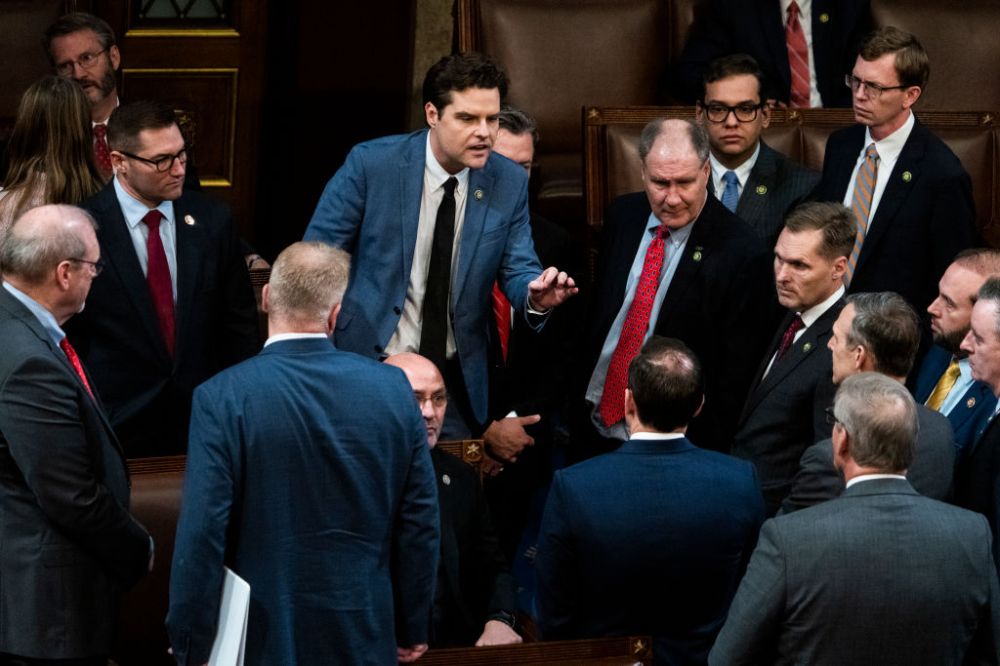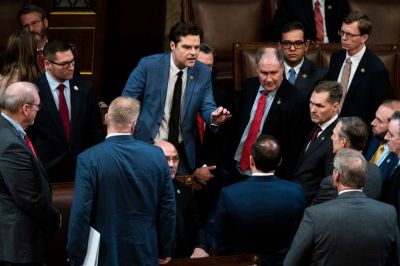A lot can change in a few weeks.
In December, GOP Leader Kevin McCarthy answered with a flat no when asked if he would commit to bringing spending bills forward under open rules as speaker of the House. But now, with his speakership bid in peril, McCarthy’s opponents say he has agreed to do just that.
The move would allow extended debate and consideration of member amendments on the House floor—and in a chamber this closely divided, it may spark pandemonium as unlikely coalitions vie for their priorities.
The agreement is just one of the concessions McCarthy has made to his detractors in an attempt to become speaker, and more may come. Rep. Ralph Norman, a South Carolina Republican who has opposed McCarthy in each of the 11 ballots for speaker thus far, described the concessions as “round one.”
“It’s on paper, which is a good thing,” he added. Norman said Thursday night the proposal includes a commitment to following a 72-hour rule for members to review legislation before voting on it, an agreement to bring legislation imposing term limits on members of Congress forward for a vote, and “a lot of other things,” including an open amendment process for spending bills.
It’s a major victory for the lawmakers who want rank-and-file members to have more say in the legislative process, but it still isn’t expected to be enough on its own to win McCarthy enough votes to claim the speaker’s gavel.
If McCarthy prevails and open rules for major bills become reality, they wouldn’t be novel. Until recent decades, a healthy, sprawling amendments process was the norm for spending bills in the House, as well as other legislation. But leaders in both parties have turned to closed processes in recent Congresses to save floor time and avert unpredictable debacles that can emerge from a more freewheeling approach.
An open amendments process wouldn’t just empower the House Freedom Caucus. It would empower centrists and Democrats, too. Under open rules, Democrats would be able to advance their own ideas, without Republican leaders blocking them from being considered in the first place. The House Rules Committee is able to advance legislation under closed rules—effectively shutting down debate—or structured rules, which allow only certain amendments to be considered on a given piece of legislation.
But with open rules, members would have more power to attach their amendments to the spending bills in question. Democrats could do so on any number of issues if they can win over just a few Republicans.
And there will be lots of opportunities for those kinds of coalitions to emerge.
Think of plans to grant immigrants pathways to permanent legal status, an issue some moderate Republicans could join Democrats to support. Another example, where there may be some Freedom Caucus overlap with Democrats: repealing the 2002 authorization for the use of military force against Iraq.
Votes like that would be interesting to witness, and they would get members on the record on hundreds of amendments. But it’s still just one part of the legislative process, and the Senate could always reject the House’s ideas later on.
“This is sort of a shell game,” said Josh Huder, a senior fellow at Georgetown University’s Government Affairs Institute. “We’re talking about changing the amendment process on legislative vehicles that will not become law.”
It’s not clear whether McCarthy will ultimately prevail in his speakership bid, so it’s not certain the agreement will hold into the new Congress. Yet it is likely that the group of far-right Republicans opposing him would make these same demands of any other potential speaker.
“They’ve basically set the table of what they expect the next speaker needs to agree to, and now they get to determine to a greater degree who that person actually is as opposed to the anointed, natural successor,” Huder told The Dispatch. “I think it’s sort of a floor baseline expectation at this point.”
Huder noted that former Speaker John Boehner also attempted to open up debate on spending bills when Republicans held the House in 2011, but it was unwieldy. In an era of increasing polarization, many of the amendments lawmakers proposed were designed as political cudgels rather than serious attempts to make law. Huder recalled being at the Capitol while the House was debating a spending bill at the time and hearing two Republican leaders lamenting that the “wheels have come off the wagon” as they tried to keep the bill on a pathway to passage despite divisive language members were working to attach to it.
These messaging amendments cut both ways: Conservatives can propose controversial language other Republicans would have a hard time voting against, jeopardizing support among Democrats needed to pass the overall legislation. And Democrats can pass amendments that force Republicans to tank the bill.
When House Speaker Paul Ryan allowed freewheeling amendments on spending bills in 2016, Democrats once advanced language blocking federal contractors from discriminating against LGBTQ people, with support from more than 40 Republicans. That led conservatives to tank the overall water and energy spending bill that had been amended.
“I would love to be pleasantly surprised, but I’m confident this process will crater and they’ll end up with no bills done on time again,” said Brendan Buck, a former aide to Boehner and Ryan.
Ryan cut down on open rules after that—drawing criticism from libertarian-minded lawmakers.
“This was mostly a discussion about closing down the appropriations process and giving the speaker more control under the reasoning that Democrats will hurt Republicans and that the rank-and-file members can’t be trusted with legislating,” Kentucky Rep. Thomas Massie said after Ryan told members he would move to avoid debacles like the water and energy bill failure.
If McCarthy’s concession holds, Republican leaders won’t be as well-positioned to protect their members from politically painful votes. That last concern could reverberate among moderate Republicans who are already growing frustrated with everything McCarthy is handing to the Freedom Caucus.
For now, Democrats are looking forward to perhaps having more say on the House floor than they had expected, even if they’re not optimistic about how this Congress may unfold.
“Having opportunities for people to amend legislation is a good thing,” said Rhode Island Democratic Rep. David Cicilline. “But it’s coupled with a series of other incredibly awful proposals.”
And Rep. Rosa DeLauro, the top Democrat on the Appropriations Committee, said she’s ready to get to work.
“I’ve dealt with open rules on Appropriations,” she said. “We’ll see how it works.”
“You have the opportunity to make your case on the floor of the House,” she added. “But if it is used as a way to delay, to obfuscate and so forth, then one has to take that into consideration.”






Please note that we at The Dispatch hold ourselves, our work, and our commenters to a higher standard than other places on the internet. We welcome comments that foster genuine debate or discussion—including comments critical of us or our work—but responses that include ad hominem attacks on fellow Dispatch members or are intended to stoke fear and anger may be moderated.
With your membership, you only have the ability to comment on The Morning Dispatch articles. Consider upgrading to join the conversation everywhere.